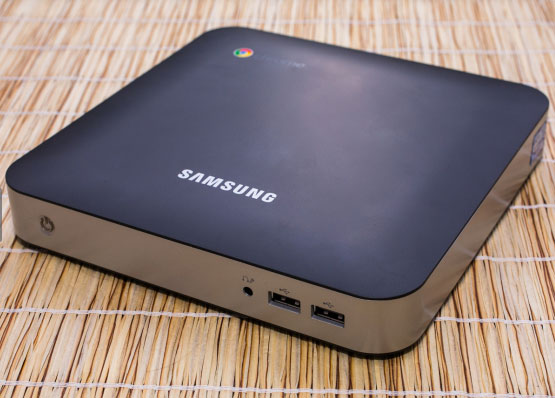Google's Chromebox a great corporate play?

Google and Samsung have launched new Chromebooks, which feature the latest Chrome OS, and an interesting desktop play dubbed the Chromebox.

The Chromebox
(Credit: CNET)
The Chromebook overhaul features better hardware, revised software and improved handling of cloud documents. CNET's Stephen Shankland has the hits, runs and errors with the Chromebook. In a nutshell, Google's Chromebook is improved, but still out of the mainstream.
However, the Chromebox could be an interesting corporate play, as well as a way to dabble with the Chrome OS. Google's Chromebox is akin to an Apple TV or Roku box form factor. The price tag is too high at US$329, but you see where this could be headed: cloud desktops for US$199 and below.
Shankland noted:
The Chromebox could be useful for corporate environments, such as call centres, schools and libraries, where people don't need full-fledged PCs, and where Chrome OS's management benefits stand out. For those customers, Google dropped its subscription pricing plan and now charges the retail price plus US$150, which gets customers the administration tools, hardware warranty and lifetime support, including 24-hour phone support.
In other words, a corporate Chromebox will run you US$479 for hardware and support. If that hardware price comes down — and there's no reason to believe that it won't — Google shops that use Google Apps or browser-based software-as-a-system (SaaS) tools may have an entry point.
Given that Google handles updates, security and admin, the Chromebox could be appealing. It's unclear how Google would compare with the virtual desktop movement, but clearly the back-end infrastructure would be cheaper. Virtual desktop arrangements typically require datacentre enhancements.
For business users, the Chromebox may be a better play than the Chromebook. Although Chrome OS has improved offline document handling, the reality is that a Chromebook is a dud without a Wi-Fi or mobile connection. Desktop users on the Chromebox would theoretically always be connected. In that situation, a Chromebox could serve as a desktop replacement.
Google has also tossed in a Chrome Remote Desktop extension to run old PC software. That extension is still a work in progress.
The Chromebook and Chromebox efforts are still largely beta programs, but Google is getting closer, and could close gaps, should its Chrome OS improve. CNET's Scott Stein noted:
I would not recommend the Chromebox for general-purpose budget computing, due to the lack of general hardware and software compatibility. Its miniscule local storage also prevents the Chromebox from working well as a small home-theatre PC. If you follow either Google or operating system news, you will know that this PC represents Google's first attempt at expanding its Chrome operating system to the desktop. Given that the Chromebox's laptop counterpart, the Chromebook, is such a difficult proposition, I was surprised by how much I actually liked this computer.
Bottom line: Chromebox may resonate with vertical industries and SMBs much better than the Chromebook did. Businesses looking for a thin client won't be sweating home theater uses.
Via ZDNet US